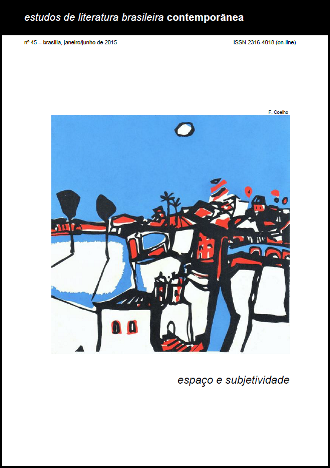“Nós somos machistas”:
entrevistas com escritores/as brasileiros/as
DOI:
https://doi.org/10.1590/2316-40184524Abstract
Este dossiê reúne seis conversas com escritores(as) brasileiros(as) levadas a cabo no âmbito da Feira do Livro de Frankfurt em 2013: Ana Paula Maia, Beatriz Bracher, Bernardo Ajzenberg, Carola Saavedra, Ferréz, Luiz Ruffato e Marcelino Freire. As primeiras questões das entrevistas centram-se em assuntos relacionados com os estudos de gênero, nomeadamente os diferentes conceitos de masculinidade(s) e feminilidade(s) na sociedade e na literatura brasileiras, partindo da teoria elaborada pela socióloga australiana R. W. Connell, uma das mais relevantes acadêmicas contemporâneas na área das masculinidades e das relações de gênero. Segue-se uma série de perguntas sobre as particularidades da obra de cada um(a) dos(as) escritores(as), as suas principais preocupações estéticas e as conexões com as obras dos(as) outros(as).
Downloads
References
ARCHETTI, Eduardo P. (2003). Masculinidades: fútbol, tango y polo en la Argentina. Buenos Aires: Antropofagia.
CONNELL, R. W. (2005). Masculinities. 2. ed. Berkeley; Los Angeles: University of California Press.
DAVID, Deborah S.; BRANNON, Robert (1976). The male sex role: our culture”Ÿs blueprint of Manhood, and What it”Ÿs Done for Us Lately. In: ______ (Eds.). The forty-nine percent majority: the male sex role. Reading: Addison-Wesley.
FULLER, Norma (2001). Masculinidades: cambios y permanencias. Varones de Cuzco, Iquitos y Lima. Lima: Fondo Editorial de la Pontificia Universidad Católica del Perú.
GRÜNNAGEL, Christian (2015). Von Kastraten, Hermaphroditen und anderen Grenzgängern lateinamerikanischer Männlichkeit in Literatur und Film (1967-2007): Ein Blick der „Peripherie”Ÿ auf Sex und Gender. (No prelo.)
GUTMANN, Matthew C. (Org.) (2003). Changing men and masculinities in Latin America. Durham; London: Duke UP.
GUTMANN, Matthew C. (2007). The meanings of macho: being a man in Mexico City. 2. ed. Berkeley; Los Angeles; London: University of California Press.
MCKEE IRWIN, Robert (2003). Mexican masculinities. Minneapolis: University of Minnesota Press.
MILLINGTON, Mark (2007). Hombres in/visibles: la representación de la masculinidad en la ficción latinoamericana (1920-1980). Bogotá: Fondo de Cultura Económica.
MIRANDÉ, Alfredo (1997). Hombres y machos: masculinity and Latino culture. Oxford: Westview Press.
OLAVARRÃA, José; PARRINI, Rodrigo (2000). Masculinidad/es: identidad, sexualidad y familia. Santiago de Chile: FLACSO.
PELUFFO, Ana; SÁNCHEZ PRADO, Ignacio A. (2010) (Org.). Entre hombres: masculinidades del siglo XIX en América Latina. Madrid: Iberoamericana; Frankfurt: Vervuert.
RAMÃREZ, Rafael L. (1999). Dime capitán: reflexiones sobre la masculinidad. 2. ed. Río Piedras: Huracán.
VALDÉS, Teresa; OLAVARRÃA, José (1998) (Org.). Masculinidades y equidad de género en América Latina. Santiago de Chile: FLACSO.
Downloads
Published
How to Cite
Issue
Section
License
Authors who publish in this journal agree to the following terms:
a) The authors maintain the copyright and grant the journal the right of first publication, the work being simultaneously licensed under the Creative Commons Attribution License-Non Commercial 4.0 which allows the sharing of the work with acknowledgment of the authorship of the work and publication this journal.
b) Authors are authorized to enter into additional contracts separately, for non-exclusive distribution of the version of the work published in this journal (eg publish in institutional repository or as a book chapter), with authorship recognition and publication in this journal.
c) Authors are allowed and encouraged to publish and distribute their work online (eg in institutional repositories or on their personal page) after the editorial process, as this can generate productive changes, as well as increase the impact and citation of published work (See The Effect of Free Access).
d) The authors of the approved works authorize the magazine to, after publication, transfer its content for reproduction in content crawlers, virtual libraries and the like.
e) The authors assume that the texts submitted to the publication are of their original creation, being fully responsible for their content in the event of possible opposition by third parties.


